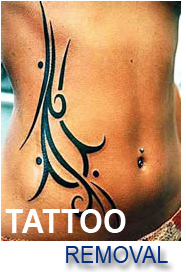|
|

Tattoo Removal
Decorative tattoos have a history dating back
more than 5,000 years. The desire to remove them has existed
for just as long. Early attempts to remove tattoos have had
less than desirable effects. Dermabrasion, saltabrasion, Argon
or CO2 lasers left behind scars in place of a tattoo.
The advent of Q-Switched lasers has permitted the removal
of most tattoo inks with very low risk of scarring. The Medlite
Q-Switched Nd: YAG laser is the laser of choice. The Medlite
laser can significantly lighten or completely remove a wide
variety of tattoo inks.
The Medlite laser removes tattoo ink with the energy of light.
The rapid absorption of light energy causes the tattoo ink
to break into tiny particles which can then be removed by
the body’s natural filtering systems. The Medlite laser
provides maximum tattoo removal while leaving the surrounding
skin unharmed.
On average, professional tattoos require 6-8 treatments, while
homemade tattoos require 4-5 treatments. Treatments are spaced
6-8 weeks apart. The number of treatments is dependent upon
the amount of ink used, and the depth of the ink in the skin.
Blue, black, and red inks will resolve best. Oranges and purples
usually fade as well. Green and yellow inks are the most difficult
to remove, and require additional treatments.
The laser pulse feels like a small rubber band snapping on
the skin. Most patients do not require anesthesia, depending
on the size and location of the tattoo. Local anesthesia creams
are available if needed. Antibacterial ointment and a dressing
will be applied to the area after treatment. The treated area
should be kept clean. A shower can be taken the next day.
Laser Treatment of Tattoos
Tattooing is an ancient art form dating back as far as the
Stone Age (12,000 BC). Egyptian mummies from 4000 BC show
evidence of attempts at tattoo removal.
Times changes, your tastes change, and your life changes.
You change your clothes; you change your hairstyle -- so why
shouldn't you be able to eliminate unwanted tattoos? Or fade
them to prepare the area for a different tattoo.
As one patient said: "I loved my tattoo when I got it,
but I'm at a point in my life now where I no longer care to
have it. The Medlite laser was the solution for me."
There are three general types of tattoos:
1. Decorative tattoos are tattoos placed on the skin as a
decoration. These are the most common type of tattoo. Some
are homemade with needle and India ink; others are professionally
applied with a tattoo gun using one or more colors of tattoo
ink. Professional tattoos are deeper, contain more ink, and
usually need extra treatments.
2. Cosmetic tattoos are also known as micro- pigmentation
or permanent cosmetics. This type of tattoo is used as permanent
eyeliner, lip liner, lipstick, and other permanent cosmetic
purposes. This type of tattoo is also used to cover skin pigment
disorders, scars and other blemishes.
3. Traumatic Tattoos are foreign substances, such as dirt,
that are embedded in the skin through an accidental injury.
|

